|
What do we know of himself ...? The answer is: very little. Herodotus is anonymous to
the large extent, in fact the only thing he really tells us is his name and origin...
|

|
|
|
Herodotus 
|
|
Herodotus's birth date: 474 BC ?
Herodotus himself does not tell us so we use calculations, based on Apollodorus's work which suggests that Herodotus
was born 40 years before the foundation of Thurii in 444/3 BC. He is also believed to be born 'a little before
the Persian wars' ie before 480 BC?
Herodotus's travels
We are unsure to what extent he has travelled. Some authors would have us believe that Herodotus did not go to
every place he would have us believe that he has visited, such as Egypt. We can be fairly certain that he visited
Samos, Athens and Thurii but beyond that one cannot provide conclusive evidence for his travels. He suggests he
has been to Egypt (Book 2:150), Scythia (4:76 as he talked to Tymnes), Cyrene (4:163).
Herodotus's death
This is even more uncertain than the date of his birth. Scholars believe that he does not mention anything beyond
the date 430 BC and appears to be unaware of the destruction of the Aeginetans in 424 BC.
Thought to have lived between 484 - 425 BC, Herodotos, also called the 'Father of History', was born in Halicarnassus,
now Bodrum. His work is the first history of ancient times. Halicarnassus was belonging to Caria, so he was a native
of Caria, his father Lykses and his oncle Panyassis, a prose writer of his time, were of noble Carian birth.
The significance of Herodotos' history is twofold, first our knowledge of early history comes from his work »Historia«
and second, he gives a wide picture of the social life with great detail. His Carian spirit never died, although
he was exiled after the execution of bis uncle Panyassis bv the tyrant satrap Lygdames in Caria.
Leaving his homeland for good, Herodotos travelled all around Egypt, Mesopotamia, Persia, Iskhi, the Black Sea
Region, the whole of Anatolia and Sicily, finally to settle in Samos. He completed his great prose in seven years,
influenced by Pericles of Athens and Socrates, the philosopher of the time. This perhaps led him to adopt a biased
view in favour of Hellenic people. However his book is a major work on Anatolian people and without Herodotos,
there would have been no true account of earlier history. Especially his description oft he Carian people is now
very valuable for archaeologists on the subject Caria.
 Herodotus (484?-425 BC), Greek historian, known as
the father of history, born in Halicarnassus (now Bodrum, Turkey). He is believed to have been exiled from Halicarnassus
about 457 BC for conspiring against Persian rule. He probably went directly to Samos, from which he traveled throughout
Asia Minor, Babylonia, Egypt, and Greece. The direction and extent of his travels are not precisely known, but
they provided him with valuable firsthand knowledge of virtually the entire ancient Middle East. About 447 BC he
went to Athens, then the center and focus of culture in the Greek world, where he won the admiration of the most
illustrious men of Greece, including the great Athenian statesman Pericles. In 443 BC Herodotus settled in the
Panhellenic colony of Thurii in southern Italy. He devoted the remainder of his life to the completion of his great
work, entitled History, the Greek word for "inquiry." Herodotus (484?-425 BC), Greek historian, known as
the father of history, born in Halicarnassus (now Bodrum, Turkey). He is believed to have been exiled from Halicarnassus
about 457 BC for conspiring against Persian rule. He probably went directly to Samos, from which he traveled throughout
Asia Minor, Babylonia, Egypt, and Greece. The direction and extent of his travels are not precisely known, but
they provided him with valuable firsthand knowledge of virtually the entire ancient Middle East. About 447 BC he
went to Athens, then the center and focus of culture in the Greek world, where he won the admiration of the most
illustrious men of Greece, including the great Athenian statesman Pericles. In 443 BC Herodotus settled in the
Panhellenic colony of Thurii in southern Italy. He devoted the remainder of his life to the completion of his great
work, entitled History, the Greek word for "inquiry."
The History has been divided by later authors into nine parts. The earlier books deal with the customs, legends,
history, and traditions of the peoples of the ancient world, including the Lydians, Scythians, Medes, Persians,
Assyrians, and Egyptians. The last three books describe the armed conflicts between Greece and Persia in the early
5th century BC. In the History the development of civilization moves inexorably toward a great confrontation between
Persia and Greece, which are presented as the centers, respectively, of Eastern and Western culture. Herodotus's
information was derived in part from the work of predecessors, but it was widely supplemented with knowledge that
he had gained from his own extensive travels. Although he was sometimes inaccurate, he was generally careful to
separate plausible reports from implausible ones.
The Historiesy may be the first known creative work to be written in prose. Both ancient and modern critics have
paid tribute to its grandeur of design and to its frank, lucid, and delightfully anecdotal style. Herodotus demonstrates
a wide knowledge of Greek literature and contemporary rational thought. The universe, he believed, is ruled by
Fate and Chance, and nothing is stable in human affairs. Moral choice is still important, however, since the gods
punish the arrogant. This attempt to draw moral lessons from the study of great events formed the basis of the
Greek and Roman historiographical tradition, of which Herodotus is rightly regarded as the founder.
Contributed by:
Jay Bregman
|

|
|
|

|
|
Wer bislang all die bekannten Namen von griechischen Künstlern und Wissenschaftlern dem
heutigen Griechenland zuordnete, der muß hier an der türkischen Ägäis schnellstens umlernen.
Herodot, Thales, Praxiteles und wie sie alle hießen, lebten entweder in oder nah bei Bodrum. Selbst Themistokles
verbrachte seine letzten Jahre in Magnesia, nah bei Ephesus.
ne hour's walk from Pedasa. It is advised to take along a guide. Nearing the city one will see
domed tombs resembling cisterns; built with the ashlar technique. The tombs consist of a small entrance and a single
domed burial chamber. The domes were constructed with the dry-wall technique, using stones from the vicinity.
this information is fairly certain. Further details can be given with less certainty:
He is son of Lyxes and Dryo, both lived in Halicarnassus
He had a brother called Theodorus
Herodotus was related to Panyasis, the epic poet whose works are lost
Herodotus later migrated to the island of Samos 'because of Lygdamis' (a tyrant of Halicarnassus who apparently
expelled Herodotus.)
During this time he wrote his untitled work which was later divided into 9 books named after the Muses
Some point later in life, he moved to Thurii, in S.Italy.
He is supposed to have died and been buried in the market place there, although others say he died in Pella.
All this information is fairly certain. Further details can be given with less certainty:

|

|
|
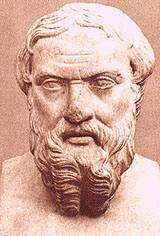
|
|

Herodotus - often recalled citizen of this town by hotels and tourism brochures, but when you have a closer look,
you will not understand that up to now there is no place and even no street namend after him

|
|
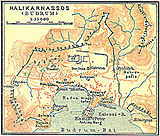
|
|
 Bodrum vor 200 Jahren Bodrum vor 200 Jahren

|
|

|
|
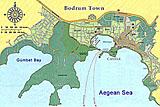
|
|
 Karte von Bodrum heute Karte von Bodrum heute
|
|

|
|

the Bodrum postcard
|
|

|
|
|
|
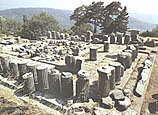
|
|
 Zeustempel Labranda Zeustempel Labranda

|
|
|
|

|
|
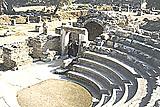
|
|
 Iassos Iassos

|
|

|
|

Die Bodrum Postkarte
|
|

|
|

|
|
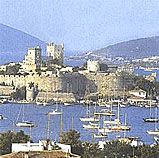
|
|
Landmark of Bodrum - the castle



|
|

|
|
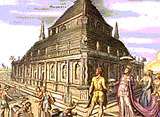
|
|
Ieine weitere Version des Mausoleums von Halikarnassos


|
|

|
|
|
Free Downloads

|
|
|
|
|